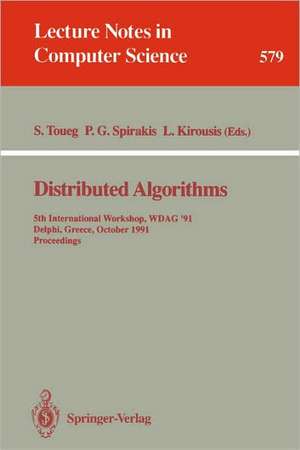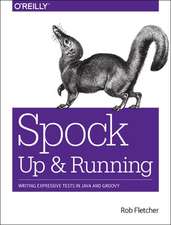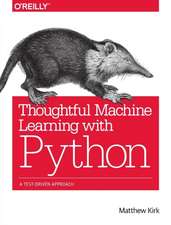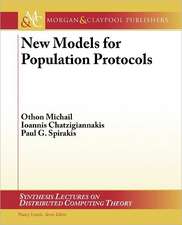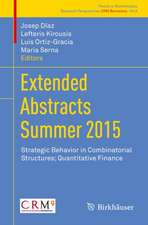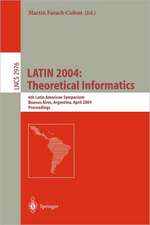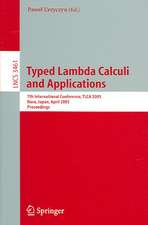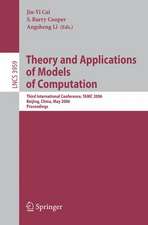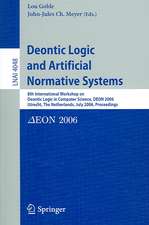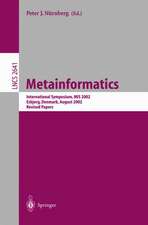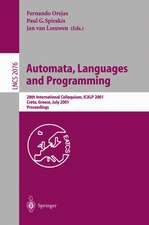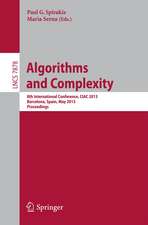Distributed Algorithms: 5th International Workshop, WDAG 91, Delphi, Greece, October 7-9, 1991. Proceedings: Lecture Notes in Computer Science, cartea 579
Editat de Sam Toueg, Paul G. Spirakis, Lefteris Kirousisen Limba Engleză Paperback – 11 mar 1992
Din seria Lecture Notes in Computer Science
- 20%
 Preț: 1061.55 lei
Preț: 1061.55 lei - 20%
 Preț: 307.71 lei
Preț: 307.71 lei - 20%
 Preț: 438.69 lei
Preț: 438.69 lei - 20%
 Preț: 645.28 lei
Preț: 645.28 lei -
 Preț: 410.88 lei
Preț: 410.88 lei - 15%
 Preț: 580.46 lei
Preț: 580.46 lei - 17%
 Preț: 427.22 lei
Preț: 427.22 lei - 20%
 Preț: 596.46 lei
Preț: 596.46 lei -
 Preț: 449.57 lei
Preț: 449.57 lei - 20%
 Preț: 353.50 lei
Preț: 353.50 lei - 20%
 Preț: 1414.79 lei
Preț: 1414.79 lei - 20%
 Preț: 309.90 lei
Preț: 309.90 lei - 20%
 Preț: 583.40 lei
Preț: 583.40 lei - 20%
 Preț: 1075.26 lei
Preț: 1075.26 lei - 20%
 Preț: 310.26 lei
Preț: 310.26 lei - 20%
 Preț: 655.02 lei
Preț: 655.02 lei - 20%
 Preț: 580.93 lei
Preț: 580.93 lei - 20%
 Preț: 340.32 lei
Preț: 340.32 lei - 18%
 Preț: 938.83 lei
Preț: 938.83 lei - 20%
 Preț: 591.51 lei
Preț: 591.51 lei - 15%
 Preț: 438.59 lei
Preț: 438.59 lei - 20%
 Preț: 337.00 lei
Preț: 337.00 lei -
 Preț: 389.48 lei
Preț: 389.48 lei - 20%
 Preț: 607.39 lei
Preț: 607.39 lei - 20%
 Preț: 1024.44 lei
Preț: 1024.44 lei - 20%
 Preț: 579.30 lei
Preț: 579.30 lei - 20%
 Preț: 763.23 lei
Preț: 763.23 lei - 20%
 Preț: 453.32 lei
Preț: 453.32 lei - 20%
 Preț: 575.48 lei
Preț: 575.48 lei - 20%
 Preț: 585.88 lei
Preț: 585.88 lei - 20%
 Preț: 825.93 lei
Preț: 825.93 lei - 20%
 Preț: 763.23 lei
Preț: 763.23 lei - 17%
 Preț: 360.19 lei
Preț: 360.19 lei - 20%
 Preț: 1183.14 lei
Preț: 1183.14 lei - 20%
 Preț: 340.32 lei
Preț: 340.32 lei - 20%
 Preț: 504.57 lei
Preț: 504.57 lei - 20%
 Preț: 369.12 lei
Preț: 369.12 lei - 20%
 Preț: 583.40 lei
Preț: 583.40 lei - 20%
 Preț: 343.62 lei
Preț: 343.62 lei - 20%
 Preț: 350.21 lei
Preț: 350.21 lei - 20%
 Preț: 764.89 lei
Preț: 764.89 lei - 20%
 Preț: 583.40 lei
Preț: 583.40 lei - 20%
 Preț: 649.49 lei
Preț: 649.49 lei - 20%
 Preț: 341.95 lei
Preț: 341.95 lei - 20%
 Preț: 238.01 lei
Preț: 238.01 lei - 20%
 Preț: 538.29 lei
Preț: 538.29 lei
Preț: 334.38 lei
Preț vechi: 417.97 lei
-20% Nou
Puncte Express: 502
Preț estimativ în valută:
63.98€ • 66.98$ • 52.94£
63.98€ • 66.98$ • 52.94£
Carte tipărită la comandă
Livrare economică 05-19 aprilie
Preluare comenzi: 021 569.72.76
Specificații
ISBN-13: 9783540552369
ISBN-10: 3540552367
Pagini: 336
Ilustrații: X, 326 p.
Dimensiuni: 155 x 235 x 18 mm
Greutate: 0.47 kg
Ediția:1992
Editura: Springer Berlin, Heidelberg
Colecția Springer
Seria Lecture Notes in Computer Science
Locul publicării:Berlin, Heidelberg, Germany
ISBN-10: 3540552367
Pagini: 336
Ilustrații: X, 326 p.
Dimensiuni: 155 x 235 x 18 mm
Greutate: 0.47 kg
Ediția:1992
Editura: Springer Berlin, Heidelberg
Colecția Springer
Seria Lecture Notes in Computer Science
Locul publicării:Berlin, Heidelberg, Germany
Public țintă
ResearchCuprins
On the limitation of the global time assumption in distributed systems.- Causal memory.- More on the power of random walks: Uniform self-stabilizing randomized algorithms.- Pseudo read-modify-write operations: Bounded wait-free implementations.- Maintaining digital clocks in step.- Implementing FIFO queues and stacks.- Optimal amortized distributed consensus.- Optimally simulating crash failures in a byzantine environment.- Efficient distributed consensus with n=(3 + ?)t processors.- Randomized consensus in expected O(n2log n) operations.- Using adaptive timeouts to achieve at-most-once message delivery.- Uniform dynamic self-stabilizing leader election.- The quickest path problem in distributed computing systems.- The communication complexity of the two list problem.- Distributed algorithms for updating shortest paths.- Minimal shared information for concurrent reading and writing.- Reading many variables in one atomic operation solutions with linear or sublinear complexity.- Analysis of distributed algorithms based on recurrence relations.- Detection of global state predicates.- Using consistent subcuts for detecting stable properties.- Atomic m-register operations.- A robust distributed mutual exclusion algorithm.- Message delaying synchronizers.
